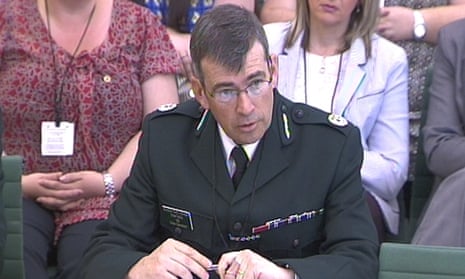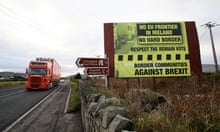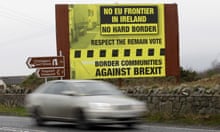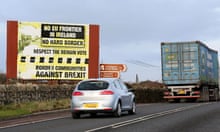Checkpoints and cameras on a future hard Irish border would be a potential target and recruitment tool for dissident terrorist groups in Northern Ireland, the region’s deputy police chief has warned.
Drew Harris said paramilitary activity was still a major concern after 58 shootings and 32 bombing incidents so far this year, which had gone largely unreported by the media.
He told members of the Brexit select committee who were visiting Northern Ireland that a new extradition treaty between the UK and Ireland may need to be drawn up to replace the European arrest warrant after Brexit.
“Dissident groups see [the border] as an area which is contentious, which will give them a further rallying call to try and engender support,” Harris told MPs. “It is of concern. They have a focus in this. They see it as an opportunity.
Quick GuideWhy is the Irish border a stumbling block for Brexit?
Show
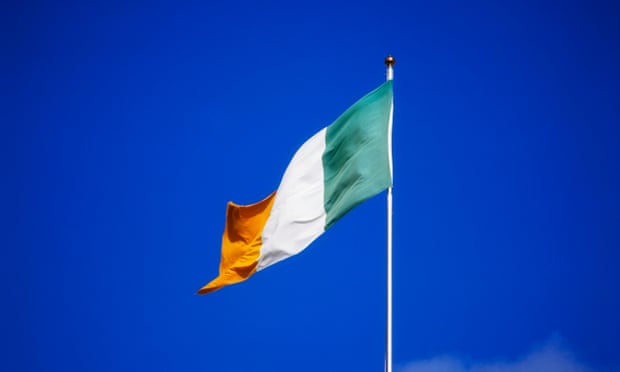
Counties and customs
Inside the EU, both Ireland and Northern Ireland are part of the single market and customs union so share the same regulations and standards, allowing a soft or invisible border between the two.
Britain’s exit from the EU – taking Northern Ireland with it – risks a return to a hard or policed border. The only way to avoid this post-Brexit is for regulations on both sides to remain more or less the same in key areas including food, animal welfare, medicines and product safety.
The 'backstop' in Theresa May's Withdrawal Agreement was intended to address this - stating that if no future trade agreement could be reached between the EU and the UK, then rules and regulations would stay as they are. This has been rejected by Brexit supporters as a 'trap' to keep the UK in the EU's customs union, which would prevent the UK striking its own independent trade deals.
There are an estimated 72m road vehicle crossings a year between Northern Ireland and the Republic of Ireland, and about 14% of those crossings are consignments of goods, some of which may cross the border several times before they reach a consumer. Brexit supporters say this can be managed by doing checks on goods away from the border, but critics say it will be difficult to police this without any physical infrastructure like border posts or cameras, which could raise tensions in the divided communities of Ireland.
Interactive: A typical hour in the life of the Irish border
“Infrastructure on the border – that would be an obvious place for dissident groups to rally around and also to attack. It is highly foreseeable that dissident groups would seek to take action and that would include [against] buildings.”
The committee was making its first visit to the Irish border since the EU referendum and will also travel to Middletown, a small crossing between County Armagh and Co Monaghan.
Hilary Benn, who chairs the committee, noted that the only visible sign of the border was a change in colour of road verge markings and difference in road surface.
Two customs houses, now dilapidated, remain on either side of the bridge. “That they are derelict is a good thing. We wouldn’t want any return to a hard border,” he said.
Brexit select committee toeing the Irish border - the change in road surface is only marker if border pic.twitter.com/1qbjxewnpV
— lisa o'carroll (@lisaocarroll) December 7, 2017
Two Brexit-supporting MPs, Jacob Rees-Mogg and the Democratic Unionist party’s Sammy Wilson, declined to take part in the trip even though the border issue is in deadlock in talks with the EU.
The committee heard how the border is vulnerable not just to smuggling of cigarettes and alcohol, but also sex offenders, human traffickers and burglars who try to use it to evade capture.
There was a huge problem 20 years ago with aggravated burglaries on elderly householders, with criminals fleeing across the border, north or south, to escape justice, Harris said.
Recently, a suspect involved in a road accident on the north side fled to the south, but was apprehended by Irish police.
This was because of the “very good working relationship with the Garda Síochána [Irish police]” that has evolved since the Good Friday agreement almost two decades ago, Harris said.
“Criminal gangs did evade us using the border. We’ve worked hard over the last 20 years to make sure that’s not the case,” the deputy chief constable said.
“We don’t want to diminish where we are at the moment that our relationships are maintained [post-Brexit].”
Drew also warned how difficult policing and cross-border justice would be if the UK pulled out of the pan-European arrest system underpinned by EU law.
“Before the European arrest warrants, extradition on the island of Ireland was very difficult,” he said.
HMRC chiefs were not asked about customs posts, but spoke about organised crime and said most smuggling would remain in areas where excise duties differed, such as on cigarettes, alcohol and fuel.
Fraud investigations were intelligence-led and would not need any extra infrastructure on the border, MPs were told.
